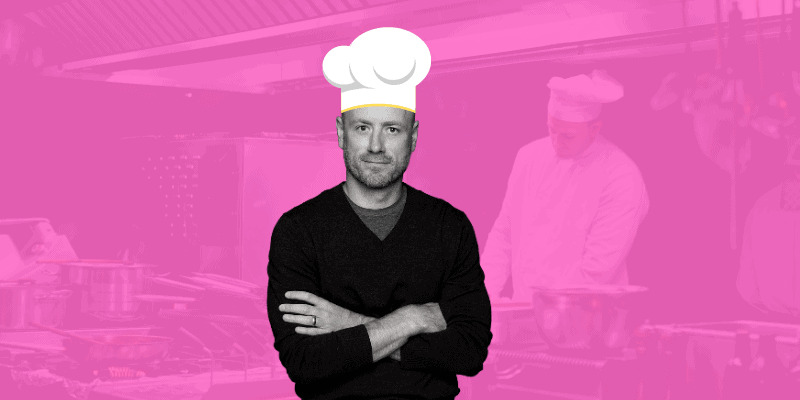
I’ve helped more than 100 brands launch over the years. Some blew up into successful companies and others simply blew up. As time passed and I ticked off more launches, I began to recognize patterns in the companies that lasted.
These patterns held true whether it was a SaaS startup or fast food restaurant. The industry, geographic location, age of entrepreneurs, and other variables didn’t matter as long as the patterns were present. I’ve distilled those patterns into 3 ingredients you find in startups that succeed.
I’m sharing those ingredients here because I want to save you thousands of dollars and soul-crushing stress. There’s nothing worse than putting your heart and soul into launching a business to see it fail. No matter how much failing helps you grow as an entrepreneur, it still sucks.
If you haven’t started your business, use these ingredients to shape what you build. If you’re running a startup, use these ingredients to reshape and revitalize your business. I promise you’ll make more money and get more sleep if you follow this recipe.
Ingredient 1: Successful startups solve a problem
It’s easy to sell painkillers. You don’t have to do a lot of convincing. People in pain just want relief. That’s what billionaire business moguls do better than us average folks. These business icons have a knack for spotting problems and building products that solve those problems. In other words, they sell pain killers. You can find examples in every possible industry around the world.
- Amazon solves the problem of having to go to a store (for anything).
- Google solves the problem of finding information.
- Starbucks solves the problem of getting a consistent cup of coffee and spot to work wherever you are.
- Facebook…screw Facebook. I don’t like them so I’m not going to point out that they solve the problem of connecting you with a huge audience of potential buyers around the world.
- Tesla solves the problem of electric cars being shitty versions of regular cars.
You can start a business or launch a product that doesn’t solve a problem, but why would you? Selling something people desperately need is a lot easier than selling something they might want. Companies that sell things people might want are the ones who struggle to define their customer and are always hunting sales.
Ingredient 2: Successful startups are known for one thing (at first)
Successful companies are easy to talk about and recommend to friends. That happens when you focus on being the best at one thing. Amazon dominated books before they dominated retail, cloud computing, and grocery. Imagine if they had come out of the gate trying to compete everywhere they are today. They would have failed. You can’t chase two rabbits out of the gate. That’s a sure recipe for ending up with no dinner and an empty stomach.
- Google was known for search before they spread into email, phones, documents, and video meetings (among 8,000 other things).
- Nike was known for running before they spread into every sport.
- FedEx is known for shipping.
- Tesla is known for electric cars.
- Salesforce is known for CRM tools.
It’s hard to master one thing. It’s impossible to master two things at once. Generational companies start by pursuing excellence in one area. Some will build a reputation and customer base and leverage it to enter new markets. Others will stay focused on their core strength. The only hard rule is that you have to pick where you’re going to be remarkable (at first).
Ingredient 3: Successful startups get repeat purchases
It’s impossible to build an empire on one-time purchases. You’ll blow through money like Charlie Sheen on a cocaine binge if you’re continuously churning customers. Billion-dollar brands are good at getting the first purchase with marketing and then the product brings customers back repeatedly. That’s how they became worth billions.
- Amazon Prime members purchase an average of 24 items per year (more like 24 per month in my house).
- McDonald’s has customers who eat there up to five times per week.
- Starbucks has millions of people who purchase 12 times per week.
- Salesforce is a subscription business.
- Nike develops lifelong fans that purchase again and again.
Don’t throw money at a business that doesn’t get repeat purchases. I personally wouldn’t start a business that doesn’t have a subscription, retainer, or other clear path to repeat purchases. At Special Sauce, my branding and marketing agency, we start each month with money in the bank because we work primarily on retainer. It’s a lot easier to breathe when you know you’ve got the revenue to pay your bills.
Does your business have all the ingredients?
Now you understand all of the ingredients that successful startups share. Let’s talk about how you can determine if you’ve got what it takes to be the next big thing. I want you to open a new document and answer these questions.
- What problem do we solve?
- Who has this problem?
- What other companies are solving this problem?
- What makes us a better choice than these other options?
- Do customers need this problem solved repeatedly (aka will we get repeat purchases)?
Make sure you’ve got clear and simple answers for every question. Once you do, you’ll be able to move forward confidently knowing that you’ve got all of the ingredients needed for business fame and fortune. Happy cooking!
Do you enjoy useful articles like this that help you grow your business? Sign up for The Recipe and you’ll get actionable branding, marketing, and persuasion tips each Friday.
